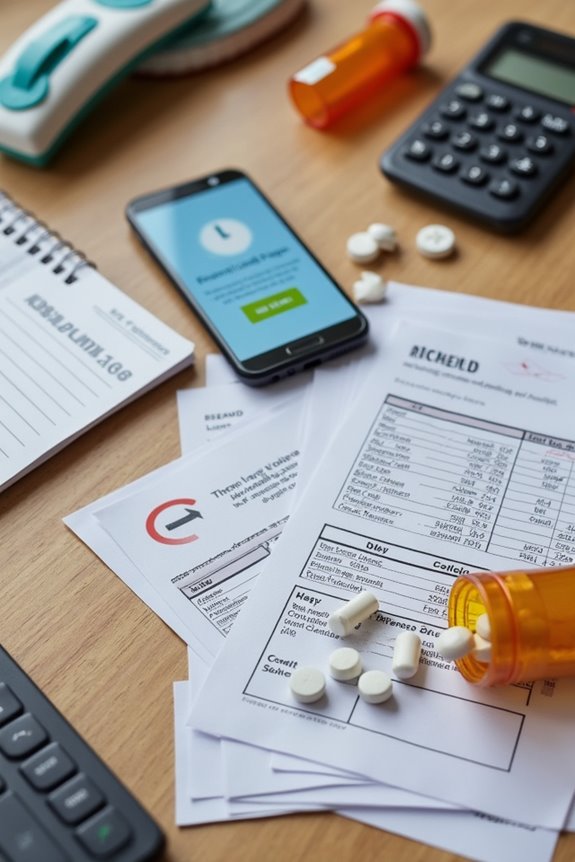Chronic pain notably affects financial health and credit scores. Key factors include:
- Increased medical costs, leading to financial strain.
- Reduced work hours, resulting in lower income.
- Impaired financial decision-making due to cognitive issues.
These elements create a cycle of debt, further impacting credit scores. Debt constitutes 30% of a FICO score; higher debt levels risk missed payments. Understanding these connections is essential for effective financial management amidst chronic pain challenges. Further insights can enhance financial stability.
Key Takeaways
- Chronic pain can lead to significant medical expenses, increasing financial strain and potentially affecting credit scores due to unpaid bills.
- Increased medication use among chronic pain sufferers correlates with higher financial insufficiency, impacting overall financial health.
- Cognitive impairments from chronic pain can hinder financial decision-making, leading to poor management and lower credit scores.
- Employment instability due to chronic pain results in reduced income and absenteeism, further complicating financial health and creditworthiness.
- Engaging with creditors and utilizing budgeting tools can help manage debt and maintain financial stability despite chronic pain challenges.
The Link Between Chronic Pain and Financial Strain
Chronic pain is intricately linked to financial strain, greatly impacting both individual and societal economic health. The economic burden associated with chronic conditions is profound, with healthcare costs consuming a significant portion of national expenditures.
- Medical bills for chronic pain are a leading cause of financial hardship, with sufferers twice as likely to struggle with medical expenses.
- Individuals with chronic pain may accumulate tens of thousands in healthcare costs over time.
- Increased medication use correlates with a 29% higher likelihood of reporting financial insufficiency.
- Chronic pain also leads to productivity losses, comprising about 80% of its total economic impact.
Consequently, financial stress exacerbates pain symptoms, creating a detrimental cycle affecting overall well-being and quality of life.
Understanding the Impact of Chronic Pain on Employment and Income

The effects of chronic pain on employment and income are significant, influencing both individual livelihoods and broader economic landscapes.
- Employment Challenges: Chronic pain often leads to increased absenteeism rates, resulting in reduced hours and unstable income.
- Productivity Loss: Individuals experiencing chronic pain report notable decreases in productivity, particularly those with multisite pain.
- Economic Burden: This condition imposes substantial costs related to healthcare and lost productivity, impacting national economies.
- Workplace Accommodations: Employers can ease these challenges through supportive policies, enhancing employee retention.
- Coping Strategies: Effective coping strategies are essential for sustaining employment amidst these difficulties.
- Healthcare Access: Access to thorough healthcare services is critical for managing chronic pain effectively and mitigating its economic impact.
The Role of Debt in Affecting Credit Scores

Debt plays a significant role in determining credit scores, which are essential for accessing financial resources. Understanding the impact of debt is vital for effective debt management.
- Debt Composition: Debt accounts for approximately 30% of a FICO credit score.
- Credit Utilization: Maintaining credit card balances below 25% of limits is recommended.
- Debt Burden: Higher debt levels can lead to missed payments, negatively affecting credit scores.
- Access to Credit: Increased debt may limit new credit opportunities, as lenders view it as a risk.
- Interest Rates: Elevated interest rates on debts can compound financial strain.
Effective debt management, including budgeting and consistent payments, is important for maintaining a healthy credit score and overall financial health.
Psychological Effects of Chronic Pain on Financial Decision-Making

Experiencing chronic pain greatly influences financial decision-making processes. The cognitive impairment associated with chronic pain disrupts attention, leading to poorer decision outcomes. Individuals often experience increased errors in financial tasks, impacting their ability to evaluate risks effectively.
Key effects include:
- Impaired working memory and executive function result in underestimating potential losses or overvaluing gains.
- Emotional distress, stemming from anxiety and depression, exacerbates financial insecurities, prompting impulsive spending as a coping mechanism.
- Heightened emotional responses skew risk evaluations, favoring immediate rewards over long-term benefits.
These psychological effects create a cycle of poor financial management, leading to worsening credit scores and increased debt burdens. Understanding these dynamics is essential for addressing the financial health of individuals living with chronic pain.
Strategies for Managing Financial Health While Dealing With Chronic Pain

Managing financial health while dealing with chronic pain requires a strategic approach that addresses both immediate needs and long-term stability. Individuals can benefit from:
- Budgeting Tools: Utilizing specialized tools can help track spending and plan for expenses related to medical care.
- Flexible Budgets: Create budgets that reflect potential income fluctuations due to chronic pain.
- Emergency Funds: Establish funds to cover unexpected medical costs or emergencies, reducing financial strain.
- Debt Negotiation: Engage creditors to potentially lower interest payments on existing debts, easing financial pressure.
- Community Resources: Access public and private financial aid programs and nonprofit organizations offering assistance.
Frequently Asked Questions
How Can Chronic Pain Affect My Ability to Get a Loan?
Chronic pain can act like a shadow, dimming one’s prospects for loan eligibility. It often disrupts income stability, leading to financial inconsistencies that hinder timely payments, ultimately affecting creditworthiness and the ability to secure necessary financing.
Are There Specific Financial Programs for Individuals With Chronic Pain?
Numerous financial assistance programs exist for individuals with chronic pain, including options for disability benefits. These resources help cover medication costs, insurance premiums, and transportation, fostering a sense of community and support for those affected.
Can Chronic Pain Impact My Insurance Premiums or Coverage?
Many chronic pain patients incur over $7,700 more annually in healthcare expenses, which can lead to higher insurance premiums. Limited insurance coverage often exacerbates these financial burdens, making access to necessary treatments increasingly challenging for affected individuals.
What Resources Are Available for Financial Counseling With Chronic Pain?
Numerous resources offer financial counseling for those with chronic pain, including nonprofit services that provide budgeting strategies and financial assistance. These programs aim to empower individuals, fostering a sense of belonging and support within the community.
How Can I Improve My Credit Score While Managing Chronic Pain?
To improve credit scores while managing chronic pain, individuals should implement effective budgeting strategies and consider credit repair techniques. By prioritizing timely payments and reducing debt, they can regain financial stability and enhance their creditworthiness.





